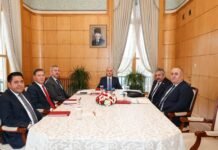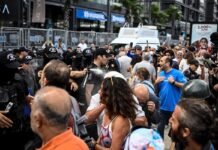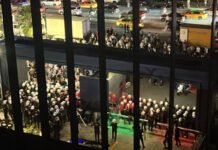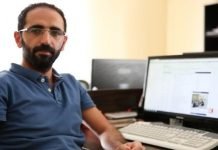The Turkish government imposed a 10-hour restriction on social media platforms on multiple internet providers in Turkey on Sunday following a deadly explosion in İstanbul, Turkish Minute reported, citing global internet monitor NetBlocks.
Six people were killed and 81 others wounded on Sunday when an explosion rocked İstiklal Avenue, a busy pedestrian street that runs through İstanbul’s central district of Beyoğlu.
Following the blast, the Information and Communications Technologies Authority (BTK) limited the bandwidth of social media and communications platforms such as Twitter, Instagram, Facebook, YouTube and some Telegram servers, and the Radio and Television Supreme Council (RTÜK), Turkey’s broadcasting watchdog, announced a media ban on the topic of the explosion.
After the government’s internet censorship went into effect, 31 percent of Turkey’s internet users turned to VPN to work around the disruption, Turkish media reports said.
Turkey has a longstanding policy of restricting access to social media platforms following explosions, political incidents and terrorist attacks, and it has been criticized for limiting access to support and assistance and curtailing press freedom in times of emergency.
However, Sunday’s measure was the first implemented by the government since a controversial media law that attracted widespread criticism from rights groups and the opposition on accusations that it will further cripple free speech took effect in October.
Although the law has mainly been criticized for requiring jail time of up to three years for social media users and journalists due to posts that spread “disinformation” and are deemed a threat to national security or public health, it also builds on legislation imposed on social media companies in 2020, with much tougher measures.
According to the law, social media companies are required to appoint Turkish representatives and face bandwidth being cut by up to 90 percent immediately after a court order should the representative fail to share with authorities users’ information if they post content constituting crimes, including misleading information.
Meanwhile, the Security General Directorate (EGM) said in a statement on Sunday that they had identified 25 social media account holders who allegedly posted “provocative content” regarding the bomb attack on İstiklal Avenue.
The state-run Anadolu news agency also reported that the İstanbul Chief Public Prosecutor’s Office launched an investigation into social media posts with “negative commentary” about the explosion.
“The whole world is talking about the bomb that exploded in Turkey right now, except Turkey. … The whole world can write about Turkey, but the citizens of the Republic of Turkey cannot write or hear about what is written,” Kerem Altıparmak, a human rights lawyer and former political science professor at Ankara University, said in a tweet, adding that it was due to a broadcast ban, an access block and the criminal investigations into people who write about Sunday’s attack.
“Turkey should end its policy of social media blackouts [and platforms should carefully moderate] during crises,” British technologist and human rights advocate Alp Toker, who owns and runs NetBlocks, also tweeted.
He underlined that access to information was “vital” in times of emergency and that research showed that social media restrictions increased “misinformation” after security incidents and attacks.
“Turkey should end its policy of social media blackouts [and platforms should carefully moderate] during crises,” British technologist and human rights advocate Alp Toker, who owns and runs NetBlocks, also tweeted.
He underlined that access to information was “vital” in times of emergency and that research showed that social media restrictions increased “misinformation” after security incidents and attacks.
Bütün dünya şu anda Türkiye'de patlayan bombayı konuşuyor, Türkiye hariç. Çünkü bizde yayın yasağı, erişim engeli var. Bu yetmezse yazana çizene açılan ceza soruşturmaları var. Türkiye hakkında tüm dünya yazabilir ama Türkiye Cumhuriyeti vatandaşları yazamaz, yazılanı duyamaz.
— Kerem ALTIPARMAK (@KeremALTIPARMAK) November 13, 2022
“Turkey should end its policy of social media blackouts [and platforms should carefully moderate] during crises,” British technologist and human rights advocate Alp Toker, who owns and runs NetBlocks, also tweeted.
He underlined that access to information was “vital” in times of emergency and that research showed that social media restrictions increased “misinformation” after security incidents and attacks.
Access to information is vital in times of emergency. Research shows that social media restrictions increase misinformation after security incidents and attacks.#Turkey should end its policy of social media blackouts (and platforms should carefully moderate) during crises. https://t.co/TQol7tqG9y
— Alp Toker (@atoker) November 13, 2022















